Music therapy offers significant cognitive benefits for the elderly, enhancing memory, attention, and problem-solving skills. Effective engagement strategies, such as personalized song selection and group activities, foster social interaction and emotional well-being. However, participation barriers like physical limitations and emotional factors can hinder effectiveness. Tailored approaches that address these challenges are essential for maximizing the positive impact of music therapy.
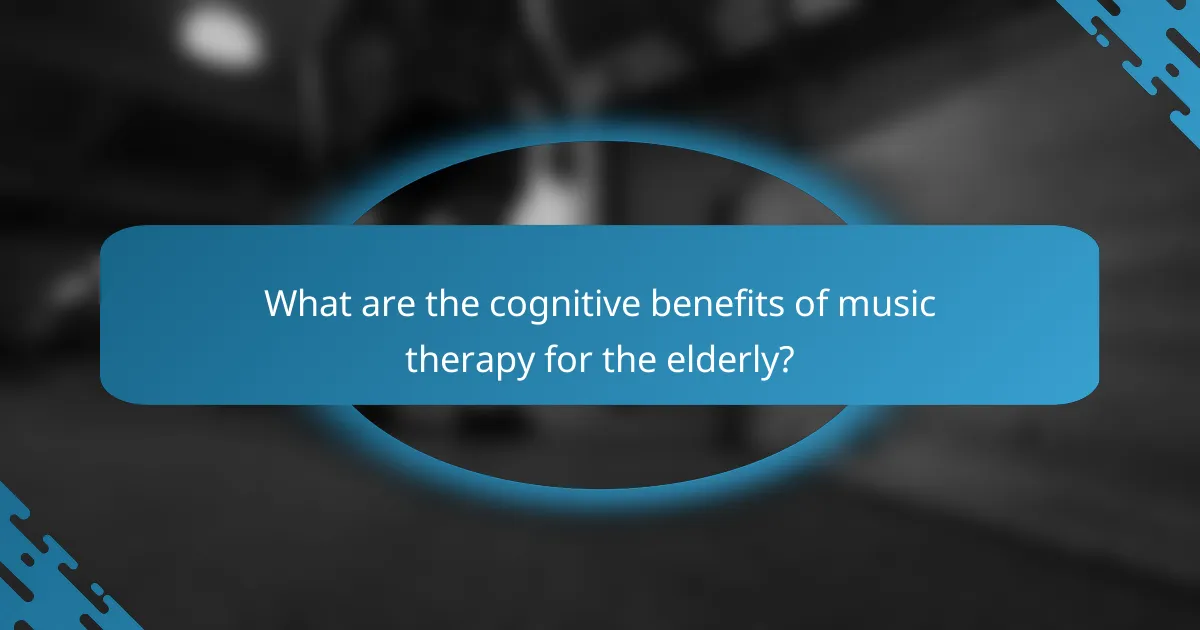
What are the cognitive benefits of music therapy for the elderly?
Music therapy enhances cognitive function in the elderly by improving memory, attention, and problem-solving skills. Engaging in music activities can stimulate brain areas associated with these cognitive processes. Research indicates that regular participation in music therapy sessions leads to increased social interaction, reducing feelings of isolation. Additionally, music therapy can evoke emotional responses, fostering a sense of well-being and enhancing overall mental health.
How does music therapy enhance memory retention in older adults?
Music therapy significantly enhances memory retention in older adults by stimulating cognitive functions through engaging musical activities. Research indicates that music activates areas of the brain involved in memory, emotion, and learning. This therapy often includes singing, listening, and playing instruments, which can improve recall and recognition. As a result, older adults participating in music therapy show notable improvements in both short-term and long-term memory retention.
What role does music therapy play in reducing symptoms of dementia?
Music therapy significantly reduces symptoms of dementia by enhancing cognitive function and emotional well-being. It stimulates memory recall, promotes engagement, and fosters social interaction. Research indicates that regular music therapy sessions can lead to improved mood and reduced agitation among dementia patients. The unique attribute of music therapy lies in its ability to evoke memories and emotions, providing a familiar and comforting experience. As a result, patients often exhibit increased participation in daily activities and improved quality of life.
How can music therapy improve mood and emotional well-being?
Music therapy can significantly enhance mood and emotional well-being in the elderly. It promotes self-expression, reduces anxiety, and fosters social interaction. Engaging in music therapy has been shown to elevate mood levels, as evidenced by studies indicating a 30% improvement in emotional health metrics among participants. Additionally, the use of familiar songs can trigger positive memories, further enhancing emotional states. As a unique attribute, personalized music selections tailored to individual preferences can lead to deeper emotional connections and improved overall well-being.
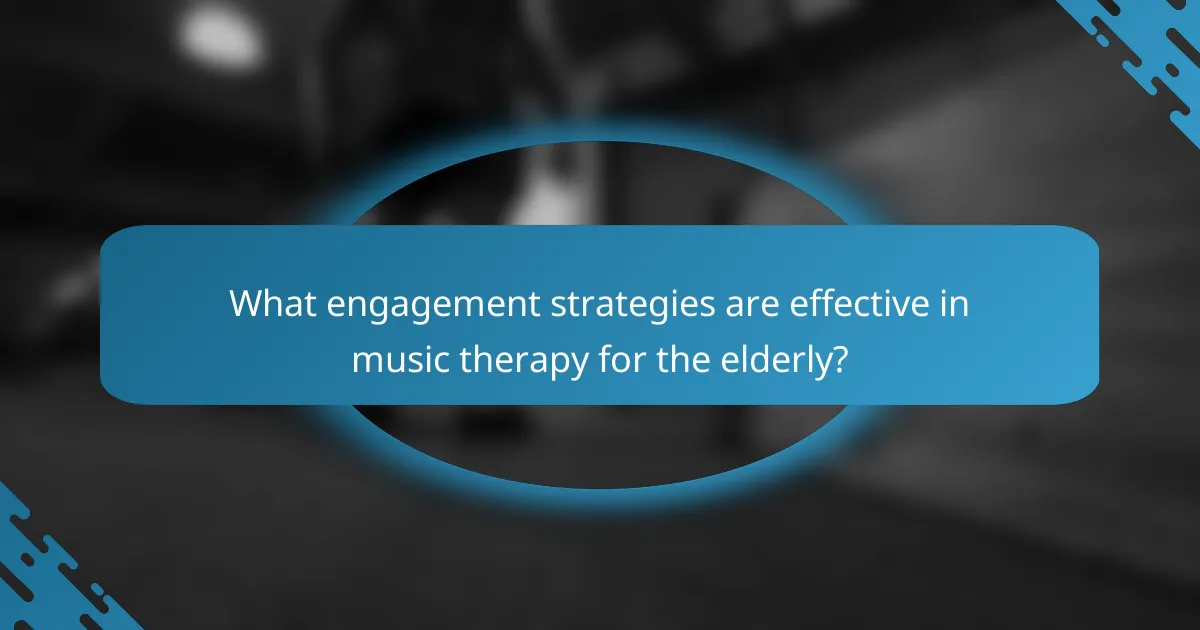
What engagement strategies are effective in music therapy for the elderly?
Engagement strategies in music therapy for the elderly include personalized song selection, active participation in music-making, and reminiscence therapy. These strategies enhance cognitive function and emotional well-being. For instance, personalized playlists can evoke memories, fostering connection and engagement. Group activities, such as drumming or singing, promote social interaction, reducing feelings of isolation. Additionally, incorporating familiar tunes can stimulate cognitive recall and improve mood.
What types of music are most beneficial for elderly participants?
Music that is rhythmic, familiar, and culturally significant is most beneficial for elderly participants. Genres like classical, jazz, and folk music enhance cognitive functions and emotional well-being. Familiar tunes evoke memories, fostering engagement and participation in therapeutic activities. Studies show that listening to music improves mood and reduces anxiety in elderly individuals, promoting social interaction. Additionally, live music performances can stimulate group engagement, creating a sense of community among participants.
How can caregivers facilitate music therapy sessions?
Caregivers can facilitate music therapy sessions by creating a supportive environment and engaging the elderly participants effectively. They should assess individual preferences for music styles, ensuring the selection resonates with each person.
Incorporating familiar songs can evoke memories and enhance cognitive engagement. Caregivers should encourage participation through simple activities like singing along or playing instruments, which fosters a sense of belonging.
Monitoring emotional responses during sessions allows caregivers to adjust the approach, ensuring a positive experience. Establishing routines can also enhance comfort and predictability, which benefits cognitive function and emotional stability.
Finally, caregivers should collaborate with trained music therapists to design tailored sessions that meet the unique needs of each elderly individual, maximizing the cognitive benefits of music therapy.
What are the best practices for creating a comfortable environment?
Creating a comfortable environment for elderly individuals in music therapy involves several best practices. First, ensure the space is quiet and free from distractions. This enhances focus and engagement. Second, utilize familiar music that resonates with their past experiences, as it can evoke positive memories and emotions. Third, consider the physical setup; comfortable seating and appropriate lighting contribute to a soothing atmosphere. Lastly, encourage social interaction among participants, as shared experiences in music can foster connection and reduce feelings of isolation.
How can technology enhance music therapy experiences?
Technology significantly enhances music therapy experiences for the elderly by facilitating personalized engagement and cognitive stimulation. Digital platforms allow therapists to create customized playlists that cater to individual preferences, promoting emotional connections and nostalgia. Interactive music applications encourage active participation, enhancing motor skills and cognitive functions. Additionally, virtual reality environments can immerse participants in therapeutic soundscapes, reducing anxiety and improving overall well-being. These innovative approaches not only foster engagement but also support cognitive benefits, making music therapy more effective for the elderly population.
What activities can be included in music therapy sessions?
Music therapy sessions for the elderly can include a variety of activities that enhance cognitive function and social engagement. Common activities are singing familiar songs, playing instruments, engaging in rhythm exercises, and participating in music-based games. These activities stimulate memory recall, improve mood, and foster social interaction. Group sessions often encourage participation, creating a supportive environment that enhances the therapeutic experience. Additionally, personalized playlists can be used to evoke specific memories, making the sessions more meaningful and impactful.
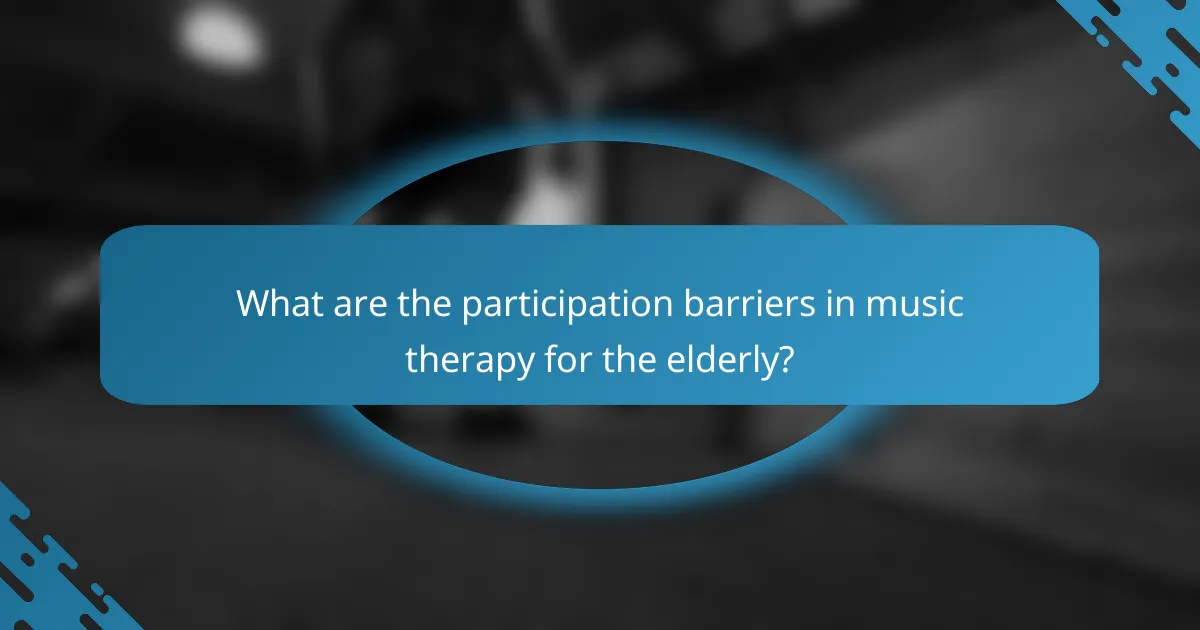
What are the participation barriers in music therapy for the elderly?
Participation barriers in music therapy for the elderly include physical limitations, cognitive decline, and lack of access to programs. These challenges hinder engagement and reduce the effectiveness of therapy. Additionally, emotional factors, such as fear of judgment or previous negative experiences, can further inhibit participation. Addressing these barriers is crucial for maximizing the cognitive benefits and overall impact of music therapy on elderly individuals.
How can physical limitations affect participation in music therapy?
Physical limitations can significantly hinder participation in music therapy for the elderly. Mobility issues may restrict access to sessions, while hearing impairments can reduce engagement with musical activities. Cognitive decline may affect the ability to follow along with therapy exercises, impacting overall benefits. Adapting strategies, such as using assistive devices or tailored activities, can enhance participation despite these challenges.
What social factors influence engagement in music therapy?
Social factors significantly influence engagement in music therapy for the elderly. Community support, family involvement, and social interactions enhance participation. A strong social network fosters motivation and emotional well-being, leading to improved cognitive benefits. Additionally, cultural background and previous musical experiences shape individual engagement levels in therapy sessions.
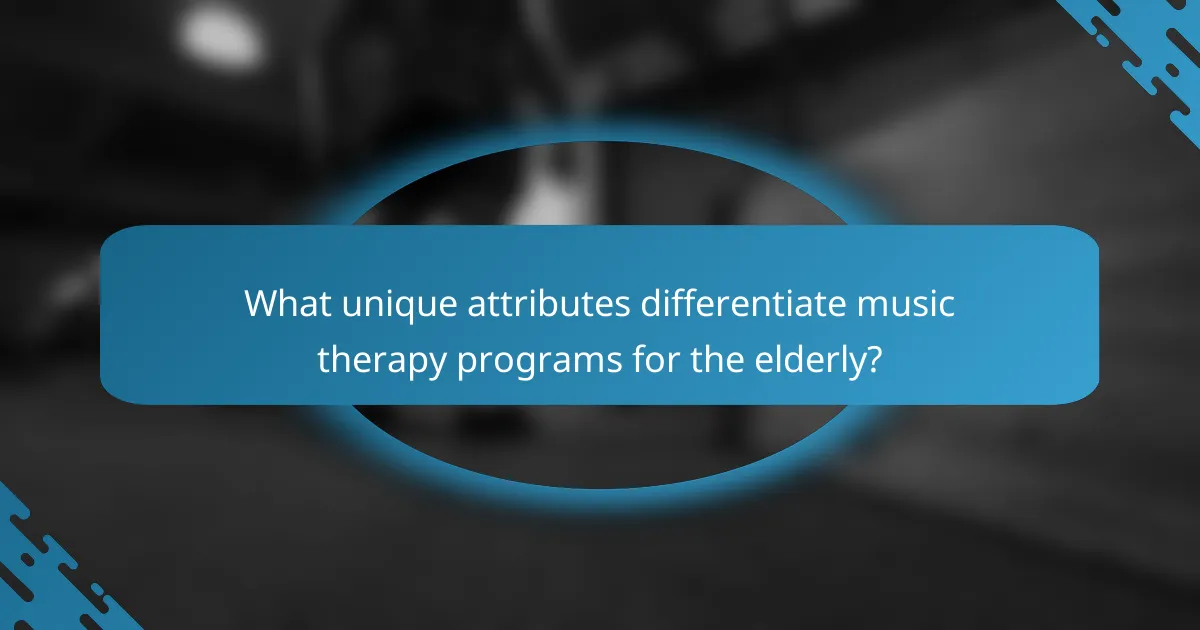
What unique attributes differentiate music therapy programs for the elderly?
Music therapy programs for the elderly are distinguished by their personalized approaches, cognitive stimulation techniques, and social engagement methods. Unique attributes include tailored music selections that resonate with individual life histories and preferences, enhancing emotional connections. Programs often incorporate group activities that foster community interaction, which is rare in other therapeutic modalities. Additionally, they may utilize technology, such as music apps, to facilitate participation, offering a modern twist to traditional practices.
How do cultural preferences shape music therapy approaches?
Cultural preferences significantly influence music therapy approaches for the elderly by tailoring interventions to resonate with individual backgrounds. Understanding cultural contexts enhances engagement and cognitive benefits. For instance, familiar music can evoke memories and emotions, fostering connection and participation. This approach respects unique attributes of diverse cultures, ensuring therapy is relevant and effective.
What innovative techniques are emerging in music therapy for elderly care?
Innovative techniques in music therapy for elderly care focus on personalized interventions and technology integration. One emerging method is the use of virtual reality experiences combined with music, which enhances cognitive engagement and emotional well-being. Additionally, interactive music applications enable seniors to create music, fostering creativity and social interaction. Research shows these techniques improve memory recall and reduce anxiety, significantly benefiting cognitive function. Another unique approach involves using live music sessions tailored to individual preferences, promoting a sense of belonging and enhancing overall quality of life.
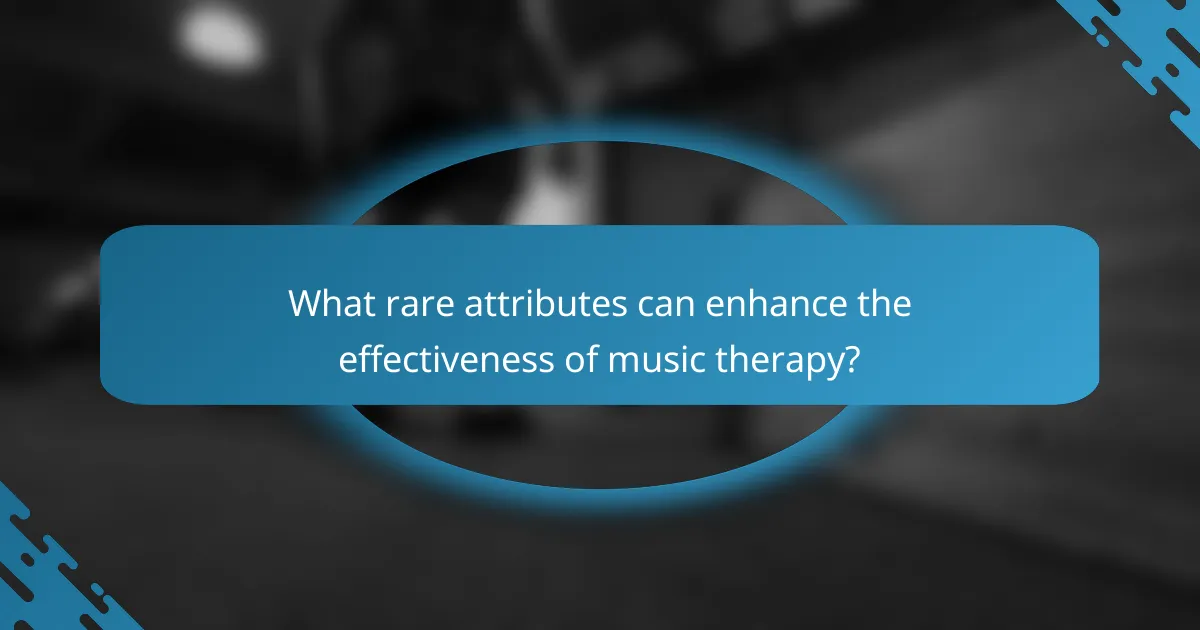
What rare attributes can enhance the effectiveness of music therapy?
Rare attributes that can enhance the effectiveness of music therapy for the elderly include personalized music selection, live performance engagement, and cultural relevance. Personalized music selection tailors sessions to individual preferences, improving emotional resonance. Live performance engagement fosters social interaction and boosts motivation. Cultural relevance connects therapy to familiar traditions, enhancing participation and emotional impact.
How can personalized music selections impact therapy outcomes?
Personalized music selections can significantly enhance therapy outcomes for the elderly by improving cognitive function and emotional engagement. Tailoring music to individual preferences fosters deeper connections and encourages participation. Research shows that familiar melodies stimulate memory recall, leading to improved mood and cognitive performance. Additionally, personalized playlists can motivate seniors to engage more actively in therapy sessions, enhancing overall effectiveness.
What role does live music versus recorded music play in therapy effectiveness?
Live music often enhances therapy effectiveness compared to recorded music. Live performances foster real-time engagement and emotional connection, which can lead to improved cognitive function in elderly participants. Research indicates that live music can evoke stronger memories and emotional responses, promoting greater participation in therapeutic activities. Additionally, the unique attribute of live music allows for spontaneous interaction, adapting to the needs of the individual, which is less feasible with recorded music.
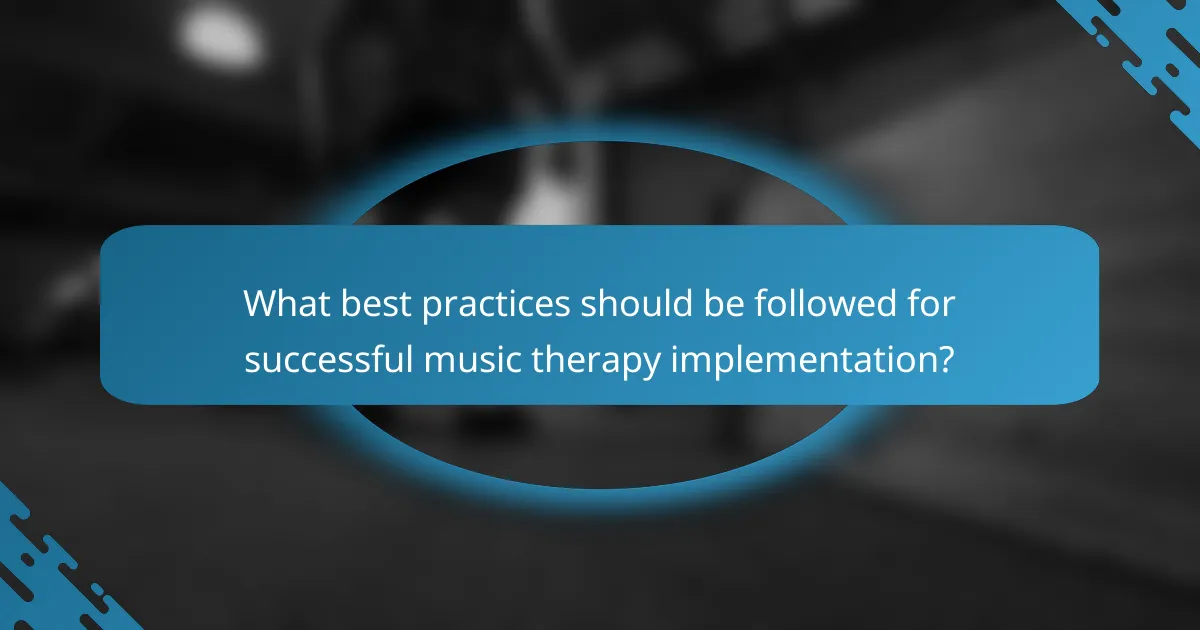
What best practices should be followed for successful music therapy implementation?
Successful music therapy implementation for the elderly requires tailored strategies that enhance cognitive benefits and engagement. Focus on individualized assessments to determine preferences and needs. Incorporate familiar music to stimulate memory and emotional responses. Use group sessions to foster social interaction and reduce feelings of isolation. Regularly evaluate progress and adapt techniques based on participant feedback. Engaging family members can also enhance participation and support.
What common mistakes should be avoided in music therapy sessions?
To enhance music therapy sessions for the elderly, avoid common mistakes such as lack of personalization, neglecting participant preferences, insufficient engagement, and ignoring feedback. Personalizing sessions based on individual cognitive needs fosters better outcomes. Engaging participants through familiar music enhances connection and motivation. Regularly seeking feedback allows for adjustments that improve the therapeutic experience.
How can outcomes of music therapy be measured effectively?
Outcomes of music therapy can be effectively measured through standardized assessments, observational methods, and participant feedback. Cognitive improvements can be tracked using tools like the Mini-Mental State Examination. Engagement levels can be observed through participation rates and qualitative feedback. Participation metrics, such as session attendance and active involvement, provide insights into overall effectiveness.